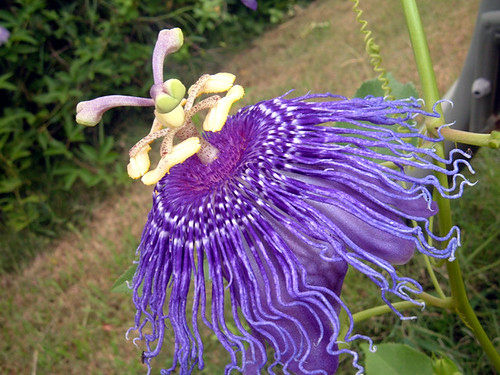I'm about to become wholly obsessed with passion flowers again.

It's an annual event with me. I'll sell seeds and rooted plants on Ebay, using the money generated that way to buy more seeds and rooted plants of different types. And I'll trade a lot of the same with other passiflora enthusiasts. Especially this year, since the drought and heat wave in 2009 wiped out a huge portion of my collection--including some relatively rare favorites. Yesterday I cleaned out some of the old pots to recycle the soil, and was surprised to find still-living roots in one. I've no idea what plant this was from, but have potted up the roots in a started pot and will see if this mystery plant rejoins us for 2010.
I also pulled out some dried fruit I'd stored and opened them up for the seeds. I had a single fruit from an edulis plant--that's the commercial fruit variety--I'd cross pollinated with my Texas native incarnata, and I planted the 60 or so seeds it contained to see if any hybrids would be of interest. I also cut open several fruit I'd collected from the tetraploid hybrid "Inspiration." The fruits were heavy and firm, and to my surprise, when I cut them open I found them full of juicy pulp. This is surprising, since they were picked in October, and all the other passion fruit I collected usually dry out within a month or two. Obviously, this one has a much stronger moisture barrier. If commercial breeders could impart this into farmed varieties, the market (and longevity) of passion fruit would increase exponentially (currently, the fruit is considered fragile and doesn't travel or store well, which contributes to its high cost). There were many large, dark seeds within, so I'm cleaning them all up for another mass planting. I don't know of any viable hybrids that've come from an Inspiration cross, so I expect many of the seeds to be sterile, but you never know. I may get lucky and sprout the next big thing in passiflora hybrids.
Now Playing: Night Ranger Greatest Hits

No comments:
Post a Comment